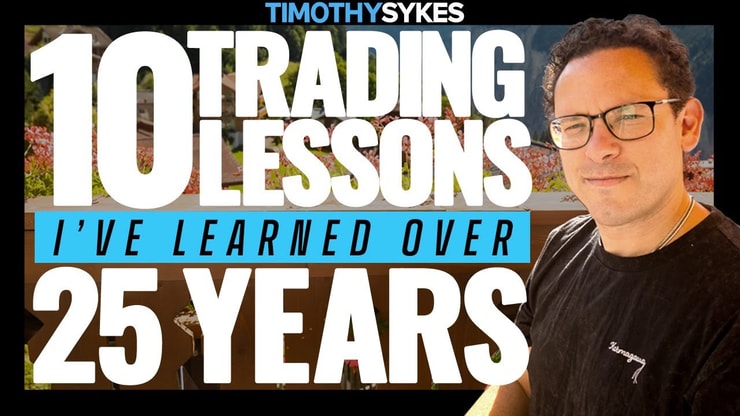Day trading can change your life — or wreck your account. It’s fast-paced, high-stakes, and brutally honest. You win or you learn. I’ve made millions trading volatile stocks in a single day, and I’ve taught thousands of students how to approach the market with discipline. But here’s the truth: most people lose because they jump in without a plan.
This guide is for traders who want to do it right. Whether you’re looking to make a living or build a side hustle, I’ll walk you through the real steps it takes to become a day trader — from choosing a strategy to managing risk to building a mindset that survives the grind.
I’ll answer the following questions:
- What is day trading?
- Can you make a living by day trading?
- What are the initial steps to start day trading?
- What should someone consider before becoming a day trader?
- Is day trading a viable option for retirement or as a full-time job?
- How can professionals benefit from day trading?
- What are the key advantages and disadvantages of day trading?
- Can anyone learn day trading?
Let’s get to the content!
Table of Contents
- 1 What Is Day Trading?
- 2 Should You Start Day Trading?
- 3 How Can You Learn To Day Trade?
- 4 How To Become a Day Trader
- 5 How To Start Day Trading
- 6 Key Takeaways
- 7 Frequently Asked Questions
- 7.1 What Is the Best Chart for Trading?
- 7.2 What Timeframe Do Day Traders Use?
- 7.3 How Does News Affect Day Trading?
- 7.4 What Are the Initial Steps To Start Day Trading?
- 7.5 What Should Someone Consider Before Becoming a Day Trader?
- 7.6 Is Day Trading a Viable Option for Retirement or as a Full-Time Job?
- 7.7 How Can Professionals Benefit From Day Trading?
- 7.8 What Are the Key Advantages and Disadvantages of Day Trading?
- 7.9 Can Anyone Learn Day Trading?
- 7.10 What Are Some Common Day Trading Strategies for Beginners?
- 7.11 How Important Is Having a Degree or Specific Background in Day Trading?
- 7.12 What Should Be Considered Before Making Day Trading a Full-Time Job?
- 7.13 What Are Some Examples of Common Mistakes in Day Trading?
What Is Day Trading?
 ©
© Millionaire Media, LLC
Day trading means buying and selling a stock (or any security) within the same day. You’re in, you’re out — all before the market closes. The goal is simple: capitalize on short-term price action. But don’t mistake “simple” for “easy.”
Traders look to profit from small intraday moves in stocks, options, ETFs, forex, or futures. The goal isn’t long-term investment — it’s speed and precision. You’re responding to catalysts: earnings, press releases, sector momentum, and price action. Not quarterly forecasts.
True day trading demands fast decision-making, a deep understanding of volatility, and fluency in tools like chart patterns, Level 2, and real-time news scanners. You’re not investing in companies — you’re reacting to momentum and trading emotion.
If you’re here for dividends or dollar-cost averaging, this isn’t your strategy.
Day trading is more than just understanding market movements; it’s about mastering the art of quick decision-making and strategy. It requires a trader to be nimble, responsive, and well-informed about market conditions. Successful day trading involves a blend of analytical skills, psychological resilience, and an ability to adapt to rapidly changing scenarios. For those looking to delve deeper into the essence of day trading and its various facets, including strategies, risks, and rewards, my exploration of day trading provides valuable insights and practical advice.
Can You Make a Living by Day Trading?
Yes — but most people don’t.
That’s the hard truth. You can make a living day trading, but it takes:
- A proven trading strategy
- Consistent execution
- Not blowing up your account
- Going for small gains
- Years of screen time
- Serious discipline
- The ability to lose without losing your mind
I’ve made over $7.9 million in my day trading career, many of my students have gone from small accounts to seven figures. But for every trader who makes it, hundreds blow up because they chase, hope, or overtrade.
Can you make it? Sure. But treat this like a business — not a lottery ticket.
While the potential for significant profits exists, so does the risk of losses in the thousands — or more. It’s a path that requires continuous learning, adapting to market changes, and managing emotions effectively. For an in-depth look at how to make a living day trading, including strategies, risk management, and realistic expectations, check out my guide on making a living through day trading.
Should You Start Day Trading?
Ask yourself these questions:
- Can you handle risk?
- Are you OK losing money — and learning from it?
- Do you have the time to watch markets daily?
- Are you obsessive about improving?
If not, this probably isn’t for you. But if you’re hungry, humble, and disciplined — get ready to enter the trading battlefield.
How Can You Learn To Day Trade?

Learning to day trade involves more than understanding financial markets; it requires a commitment to continuous education and practical experience. Beginners must immerse themselves in the world of trading by studying market trends, understanding different types of assets, and keeping up with financial news and analysis. This learning process includes grasping complex concepts like chart patterns, market orders, and risk management.
Tools like demo accounts offered by brokers like Schwab or Interactive Brokers can play a vital role. Aspiring day traders should also leverage resources like trading software, online courses, and financial news platforms to enhance their understanding and skills.
Understanding day trading indicators is crucial. These indicators, like moving averages and RSI, are tools that help traders analyze market trends and make informed decisions. They provide insights into market momentum, trends, and potential reversals, which are essential for developing effective trading strategies. For most use cases, mastering these indicators can be a game-changer, offering a deeper understanding of market dynamics. To dive deeper into the world of day trading indicators and how they can enhance your trading strategies, explore my guide on day trading indicators.
1.) Studying the Market Basics
Start by understanding how stocks, ETFs, and forex behave. Learn the difference between limit orders and market orders. Get comfortable with basic charting and pattern recognition — things like breakouts, support, resistance, and trend reversals.
Follow financial news. Read filings. Get a feel for how catalysts move the market. This is your foundation.
More Breaking News
- Credo Technology Unveils AI Innovation and Announces 3M Partnership
- DealFlow Discovery Conference Unveils Corporate Opportunities
- BigBear.ai Partners with Maqta Technologies, Enhancing AI Solutions in Port Operations
- Oracle’s Expansion Plans and Market Response Fuel Stock Momentum
2.) Sufficient Capital
You don’t need to start with $25,000 — but understand how the amount you trade with affects your flexibility. Small accounts are limited by rules (like the PDT rule in the U.S.), and commission costs or slippage can add up.
You also need enough risk capital — money you can afford to lose without compromising your financial security. Don’t trade rent money. Ever.
How Much Money Do You Need for Day Trading?
The amount of money needed for day trading varies. While you can start with a small amount, remember that trading with a small account limits the number of day trades you can make per week. Regulatory bodies like FINRA require a minimum of $25,000 in your account to day trade actively — which they define as four or more times per week.
3.) Picking a Day Trading Strategy
There’s no single strategy that works for everyone. Scalping, momentum trading, dip buying, breakout trading — they all have pros and cons.
The key is to choose one strategy, test it, and refine it. Don’t bounce from setup to setup every week. That’s how you stay inconsistent.
4.) Discipline
Discipline is what separates amateurs from professionals. It means following your plan, taking your stop losses, and not chasing garbage just because it’s moving.
It also means knowing when not to trade — no setup is often the best setup.
5.) Practicing Risk Management
Risk management is the most important part of trading. Set max losses per trade and per day. Size your positions based on your account. Use stop losses and stick to them.
The goal isn’t to win every trade — it’s to protect your capital so you can stay in the game.
How To Become a Day Trader

Becoming a day trader isn’t a decision — it’s a process. You don’t wake up profitable. You build skills. You develop patience. You get better by tracking every trade, reviewing your mistakes, and making small adjustments.
Start by learning the market. Study stocks, ETFs, forex — whatever you plan to trade. Learn what drives prices. Get comfortable with platforms, hotkeys, and execution speed.
Set up a trading plan — with rules for entries, exits, position sizing, and risk. Choose a broker that matches your needs: low fees, fast execution, strong support, and solid charting tools.
Use a demo account to test your system. Once you go live, start small. Size up when your system proves consistent.
This is a business. If you treat it like a hobby, it’ll pay like one — or worse, cost you everything.
1.) Learn the Basics
The first step is to gain a foundational understanding of the stock market. This involves learning about different types of securities like stocks, bonds, and ETFs, and how they are traded on exchanges like the Nasdaq or NYSE. Prospective traders should understand the basics of market operations, including how prices are affected by supply and demand, and the role of institutions and individual investors. Grasping the basic concepts of economics, reading financial news, and staying updated with market trends are crucial at this stage.
Additionally, learning about market regulations and the legal aspects of trading, such as margin requirements, taxes on gains, and the rules governing pattern day traders, forms an essential part of this education.
2.) Develop a Trading Plan
A trading plan is a comprehensive strategy that defines your trading style, objectives, risk tolerance, and criteria for entering and exiting trades. It should include the types of securities you intend to trade, whether it’s shares in technology companies or forex pairs. The plan must also outline the amount of capital you are willing to risk, your goals in terms of returns, and the strategies you will employ, such as range trading or using chart patterns for decision-making.
A well-structured trading plan helps maintain discipline, provides a framework to make consistent decisions, and sets clear guidelines to manage risks.
3.) Choose a Broker
Selecting the right broker is crucial for day trading. The broker should offer a trading platform that suits your style, whether it’s for quick intra-day trading or longer-term strategies. Consider factors like commission fees, the availability of margin trading, the range of available securities (like stocks, options, and futures), and the quality of customer support. Research and compare brokers thoroughly, reading reviews and checking their standing with regulatory bodies. Remember, the broker should align with your investment strategy and provide the necessary tools and resources to execute your trades effectively.
4.) Practice With a Demo Account
Before risking real money, practicing with a demo account is invaluable. Most trading platforms offer these accounts, simulating real market conditions but using virtual money. This provides an opportunity to apply your trading strategy, get accustomed to the trading platform, and understand how to execute trades effectively. It’s also a chance to experiment with different strategies and see how they perform under various market conditions.
5.) Start Small
When you begin actual trading, start with a small amount of capital. This minimizes potential losses as you gain experience. Focus on a limited number of stocks or markets to avoid being overwhelmed. Starting small allows you to test your trading plan in real-world conditions, understand market volatility, and learn how to manage your emotions when real money is at stake. Remember, even small trades can provide valuable lessons.
6.) Keep Learning
The stock market is dynamic, and continuous learning is key to staying ahead. Keep abreast of global economic news, market trends, and any factors that can influence the markets. Expand your knowledge in technical and fundamental analysis, and understand how different sectors and industries perform. Attending webinars, joining trading communities, and following experienced traders can provide additional insights and support.
7.) Analyze Your Trades
Regular analysis of your trading activity is essential. Review both successful and unsuccessful trades to understand what worked and what didn’t. Analyze the data to refine your strategies and improve your decision-making process. Tracking performance over time helps in identifying strengths and areas for improvement.
8.) Stay Disciplined
Discipline is fundamental in day trading. It’s easy to be swayed by emotions or to deviate from a plan in pursuit of higher profits. However, maintaining discipline, following your trading plan, and adhering to your risk management rules are crucial for long-term success. Understand that losses are part of the game, and the ability to stick to your strategy, even in challenging times, often differentiates successful traders from the rest.
How To Start Day Trading
You don’t need to trade a ton of tickers or memorize every technical term. But you do need a plan, real-world practice, and the right tools.
Pick a platform with fast execution and real-time data — Webull is one option for newer traders. Others prefer more advanced platforms with customizable hotkeys and analytics.
Build a workspace that works for you. Stable internet. Reliable hardware. One or two screens max to start — no need to go full NASA.
And most of all — get real about your expectations. This isn’t a get-rich-quick scheme. It’s a craft.
Key Takeaways

- Day trading is fast, high-risk, and skill-based — not luck
- A successful day trader needs strategy, discipline, and risk control
- Start small. Track everything. Learn from red days
- Practice in a demo account before going live
- Stay focused, and adapt as markets change
Trading isn’t rocket science. It’s a skill you build and work on like any other. Trading has changed my life, and I think this way of life should be open to more people…
I’ve built my Trading Challenge to pass on the things I had to learn for myself. It’s the kind of community that I wish I had when I was starting out.
We don’t accept everyone. If you’re up for the challenge — I want to hear from you.
Apply to the Trading Challenge here.
Trading is a battlefield. The more knowledge you have, the better prepared you’ll be.
Why do YOU want to start day trading? Let me know in the comments — I love hearing from my readers!
Frequently Asked Questions
What Is the Best Chart for Trading?
The best chart for trading depends on your strategy and preferences. Many traders prefer candlestick charts for their ability to display price movements and trends clearly.
What Timeframe Do Day Traders Use?
Day traders typically use shorter timeframes, such as 1-minute, 5-minute, or 15-minute charts, to make quick decisions based on recent price movements.
How Does News Affect Day Trading?
News events can have a significant impact on day trading, causing rapid price fluctuations. Traders must be adept at analyzing news quickly to understand how it might affect their trading decisions.
What Are the Initial Steps To Start Day Trading?
Learning to day trade begins with understanding the industry and familiarizing yourself with financial markets, including Wall Street dynamics and the money market. It’s essential to comprehend how credit cards and health insurance impact personal finance, as day trading can affect one’s overall financial health. Taking the first steps involves acquiring knowledge about entry points, market direction, and developing a sense of market timing.
What Should Someone Consider Before Becoming a Day Trader?
Before embarking on a day trading career, one should consider the impact it may have on their current job and lifestyle. It’s important to evaluate the financial risks and the need for a steady income, as day trading can fluctuate between profits and losses. Understanding the role of brokerage services, algorithms used in trading, and the unpredictable nature of the stock market are crucial.
Is Day Trading a Viable Option for Retirement or as a Full-Time Job?
Day trading can be an option for retirement planning or even as a full-time job for some. However, it requires a deep understanding of the stock market, trading strategies, and risk management. The idea is to generate consistent profits, but there’s no guarantee of success. It’s advisable to start with a small investment and gradually increase exposure as you gain experience.
How Can Professionals Benefit From Day Trading?
Professionals with an understanding of the financial industry, such as those with experience in brokerage or who are option writers, can leverage their expertise in day trading. They often have an advantage in identifying market trends and making informed decisions. However, even professionals must be cautious and avoid relying solely on luck or intuition.
What Are the Key Advantages and Disadvantages of Day Trading?
The advantages of day trading include the potential for quick returns, the excitement of engaging with dynamic markets, and the flexibility of working from any place. However, disadvantages include the risk of significant financial loss, the stress associated with constant market fluctuations, and the intense focus required. It’s essential to approach day trading with a clear strategy and realistic expectations.
Can Anyone Learn Day Trading?
Absolutely, anyone can learn day trading, regardless of their background or current profession. The primary reason many individuals are drawn to day trading is the potential for financial gain. However, it’s important to approach this activity with realistic expectations and understand that success in day trading requires a substantial time commitment and a degree of financial risk. It’s not a guaranteed way to make money, and there’s a significant learning curve involved.
What Are Some Common Day Trading Strategies for Beginners?
For beginners, simple day trading strategies that involve a few well-planned moves can be a good starting point. It’s essential to start with small trades, often involving only a few thousand dollars, to understand market dynamics without exposing oneself to high risk. Educational series from experienced traders or financial editors can provide valuable insights into effective trading choices and case studies of successful trades.
How Important Is Having a Degree or Specific Background in Day Trading?
While having a degree in finance or economics can be advantageous, it’s not a prerequisite for successful day trading. Many successful traders come from various backgrounds and have learned through experience, self-study, and trial and error. However, understanding the basics of the stock market and financial instruments is crucial. Continuous learning through various activities, such as following market news and engaging with online trading communities, is key.
What Should Be Considered Before Making Day Trading a Full-Time Job?
Transitioning to day trading as a full-time job requires careful consideration of various factors. It’s not just about making profitable trades; it’s also about managing risk, maintaining a steady income, and ensuring that the value of your investment portfolio aligns with your long-term financial goals. One must also consider the impact on personal life and whether their current living situation, such as the stability of income to support a house or other significant expenses, allows for the uncertainties associated with day trading.
What Are Some Examples of Common Mistakes in Day Trading?
A common example that illustrates a mistake in day trading is over-leveraging. This happens when traders, often beginners, use excessive leverage to control large positions with a relatively small amount of capital. While leverage can amplify profits, it can also lead to significant losses, something many new traders don’t fully appreciate until they experience it firsthand. Another typical case is failing to set or adhere to stop-loss orders. This oversight can lead to substantial losses, particularly in volatile markets.





Leave a reply